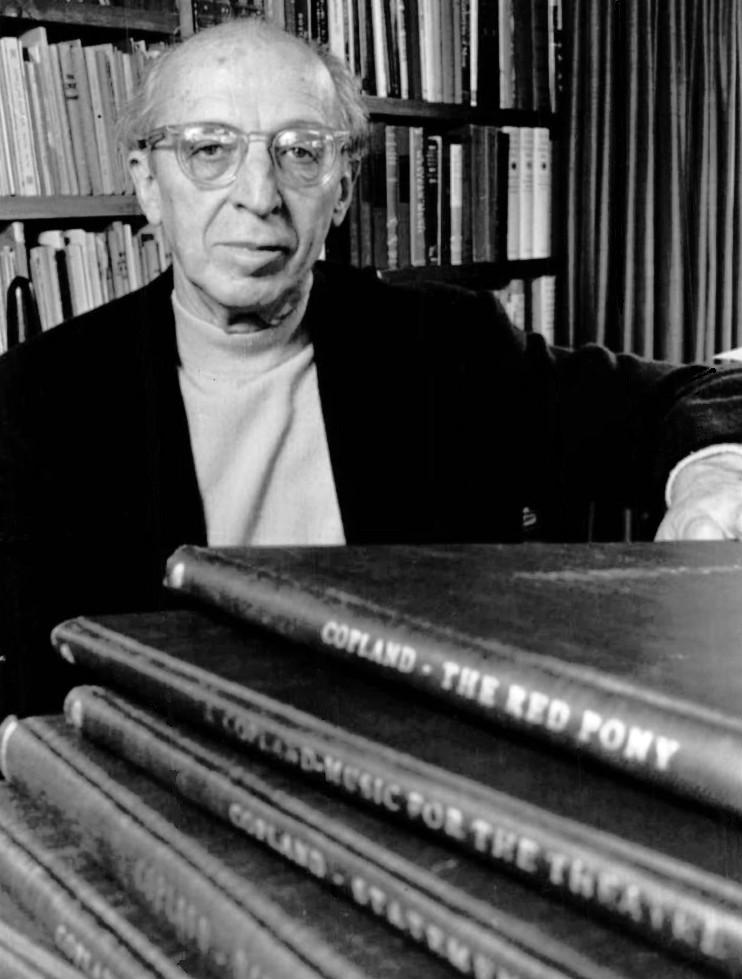Responsible for some of the most important works in 20th century American classical music, Aaron Copland earned the label the Dean of American Composers. Despite his stature, Copland was red-baited: In 1953, he was called in front of Congress. His activities and sympathies that led to that encounter are highlighted during Brevard Music Center’s A Copland Celebration, with a number of programs, including the titular concert on Friday, July 19, and Copland’s America on Sunday, July 21. Two specific performances are connected to the composer’s populist period, which eventually led to him being caught up in the 1950s Red Scare: Copland and Mexico on Saturday, July 13, and Copland and the Cold War on Wednesday, July 17.
Copland’s music moved through several distinct styles during his six-decade career. His best-known works include “Fanfare for the Common Man” (1942) and the ballet scores for Billy the Kid (1938) and Appalachian Spring (1944). But some of his earliest compositions are avant-garde and challenging such as “Piano Variations” (1930), one of the pieces to be presented as part of the July 17 program.
“It’s an abstract, high modernist piece,” says cultural historian Joe Horowitz, producer of Copland and the Cold War and Copland and Mexico for BMC. He describes “Piano Variations” as “very dissonant, which alienated audiences in 1930; [Copland] seemed like a crazy person.”
But during a trip to Mexico, Copland experienced an epiphany that set him upon a very different musical path. Upon meeting artists Diego Rivera and Frida Kahlo and composer Carlos Chávez, Horowitz says that Copland was shocked: “As an American composer, he was completely unprepared to discover that artists and intellectuals were catalysts of social and political change.” Thus inspired, he returned to the U.S. with a new mission.
Copland’s subsequent work was composed with the intent of being accessible to all listeners, not merely the intelligentsia. “He went so far as to urge his colleagues to do the same,” says Horowitz. “He said that they were morally bound to address that new audience.” Copland’s newfound focus also led him toward ballet and film scoring.
“El Salón México” (1936) and “Hoe-Down” from 1942’s Rodeo were among the most notable examples of Copland’s new everyman style. He was especially impressed with Silvestre Revueltas’ stirring orchestral score for Redes, a 1937 film from Mexico. (The July 13 program includes a screening of Redes with live orchestral accompaniment.)
Meanwhile, it didn’t escape the notice of archconservatives in the U.S. that many of the artists with whom Copland associated had left-leaning political sensibilities. Forces were hard at work attempting to root out the perceived communist menace from society.
Copland certainly didn’t help himself in that regard by composing “Into the Streets May First,” a 1934 workers’ song for The New Masses, a Marxist magazine. A stridently right-wing pamphlet in 1950, Red Channels: The Report of Communist Influence in Radio and Television, named Copland along with Lena Horne, Leonard Bernstein, Orson Welles and many others.
While Copland was clearly sympathetic to at least some ideas espoused by communists, it’s never been proved that he was a party member. That didn’t stop Sen. Joseph McCarthy of Wisconsin (and his chief counsel Roy Cohn) from compelling the composer to appear before a panel.
Copland did show up, and, for the most part, his artful answers avoided giving McCarthy and Cohn much ammunition. Still, the exchange among the three is chilling. Horowitz’s program will juxtapose a reading of that testimony against a musical backdrop of “Into the Streets May First.”
The composer’s testimony came at the tail end of the Red Scare, but, as Horowitz notes, the experience changed Copland. He quickly abandoned his music-for-the-masses approach and again adopted a more ambitious style.
Considering the current climate, Copland’s grilling at the hands of overzealous and jingoistic politicos seems timely. According to Horowitz, “You’re not going to be able to attend the event without asking yourself what it has to do with the present moment.”
WHAT: Copland and Mexico
WHERE: Whittington-Pfohl Auditorium, 349 Andante Lane, Brevard, brevardmusic.org
WHEN: Saturday, July 13, at 7:30 p.m. $20-$62
WHAT: Copland and the Cold War
WHERE: Scott Concert Hall, 1 Brevard College Drive, Brevard
WHEN: Wednesday, July 17, at 7:30 p.m. $28




Before you comment
The comments section is here to provide a platform for civil dialogue on the issues we face together as a local community. Xpress is committed to offering this platform for all voices, but when the tone of the discussion gets nasty or strays off topic, we believe many people choose not to participate. Xpress editors are determined to moderate comments to ensure a constructive interchange is maintained. All comments judged not to be in keeping with the spirit of civil discourse will be removed and repeat violators will be banned. See here for our terms of service. Thank you for being part of this effort to promote respectful discussion.